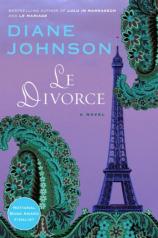Reading Group Guide
Discussion Questions
Le Divorce

1. Clara Holly Cray is an Oregon-born former actress who has lived in France for more than a decade as the wife of a renowned if reclusive Polish film director. She "remembered her roots, would rather not, and almost never went back to the U.S." Yet she belongs "very much to the American world that exists like a specialized form in a complex ecosystem, dependent on its hosts but apart from them" (1). As the quintessential American in Paris, does this mean that Clara remains an outsider in both worlds, never completely belonging to either? Does she believe that she can never be truly accepted by the French, a point that is driven home when she is arrested by the French authorities for allegedly desecrating a national monument? How, if at all, do her feelings about the French change during the course of the novel? Does she become disillusioned with her adopted country?
2. Anne-Sophie is "the American community’s ideal young Frenchwoman" (8). Yet she is engaged to Tim Nolinger, a part-American, part Belgian journalist, of whom her mother, the celebrated novelist Estelle d’Argel, does not wholly approve. How does Anne-Sophie reconcile her own ambitions and expectations of her future with those of Estelle, who clearly has a powerful influence on her daughter? In fact, it is from Estelle that Anne-Sophie "had two versions of maternal lore on how to lead life. On the one hand were the lessons of the real life Anne-Sophie saw being lived by her mother and father, her brother and herself; on the other was the general philosophy she found expressed in Estelle’s works, which represented a reality at once more sophisticated, more cynical, and more exacting" (9). That Anne-Sophie has chosen to "pattern her behavior and beliefs on things her mother had written" reveals that, at heart, she believes more in an ideal of life than in what can turn out to be a disappointing everyday existence. Does she fear that marriage to Tim, "a man given to irony and no illusions" (6) will destroy her own illusions? Or that wedded life won’t live up to them?
3. Clara knows she doesn’t love her husband, at least "not in that swept-away, sexual way she tended to doubt really existed" (57). Yet she embarks on an adulterous affair with Antoine de Persand. Clearly, Clara does believe in love. Is she deceiving herself? Or trying to justify her choices in life? Serge Cray is given to fits of temper, stony silences and, at times, verbal abuse in front of others. Does Clara feel trapped in her marriage because of their deaf son, Lars? Does she remain in her rather passive existence because of guilt over being born beautiful and choosing the easy way out—marriage to an older, rich and famous man? Is her affair with de Persand revenge against her husband? Or an expression of true love?
4. When Clara is arrested for "desecrating a national monument," "the American community draws together, united in excited indignation" (144). Yet, in spite of this show of solidarity (in particular from the political front—"Democrats in Paris and Republicans Abroad"), these foreigners on French soil cannot prevent Clara from being "dragged off by French authorities" (141). Would a Frenchwoman (or man) be treated in the same way? Does this reflect the French community’s real feelings toward the Americans in their midst? Do Americans have (or believe they have) fewer rights in France than they would in their native country? Or is this simply the way of French justice, which cannot be speeded up, imbued as it is with the "French sense of time, stately and historical, and the French certainty that events will unfold in their preordained way?" (145).
5. Johnson’s novels often mask a deeper moral complexity. In Le Mariage, how do the Americans differ from their French counterparts in their perceptions of and attitudes toward, morality, i.e., adultery, and crime, i.e., theft, wrongful arrest, murder? Are they more judgmental? Upright? Outraged? Less tolerant and blasé’?
6. When Anne-Sophie accompanies Tim and some of the others to Oregon, it is her first time in America. What does she come away from the trip with? Does it change her or her beliefs about America in any fundamental way?
7. Delia Sadler, an antiques dealer in Paris, tells Clara, a fellow Oregonian, "I would say you’re disgusting if it wasn’t rude to say it—disgusting in the sense of rolling in luxury and giving nothing back" (242). She goes on to say that "no one here knows anything about America, and the Americans who live here are the worst, they forget what it’s like at home where people are hungry and angry, and the whole country is shifting like a big mountain with some sort of geologic activity pushing up from inside it, it’s just going to split open like a big baked potato. No other American I’ve met here can imagine it, and no French person can imagine it, no way" (241). Delia seems to be saying that both cultures have little regard for human suffering. Is she making a statement about all people and all cultures? What does she say about Americans in America? Clara thinks she’s right, even though it gives the lie to the privileged life she’s been leading in France. Is the author making a statement about the human condition in general, that cruelty and suffering will always exist, try as we might to prettify our lives with the superficial trappings of wealth and position?
8. Le Mariage concludes with the wedding of Anne-Sophie and Tim. Do they seem excited? Resigned? Do the other protagonists, i.e., Clara, find some measure of contentment and/or acceptance in the end?
Le Divorce
- Publication Date: January 1, 1998
- Paperback: 320 pages
- Publisher: Plume
- ISBN-10: 0452277337
- ISBN-13: 9780452277335







